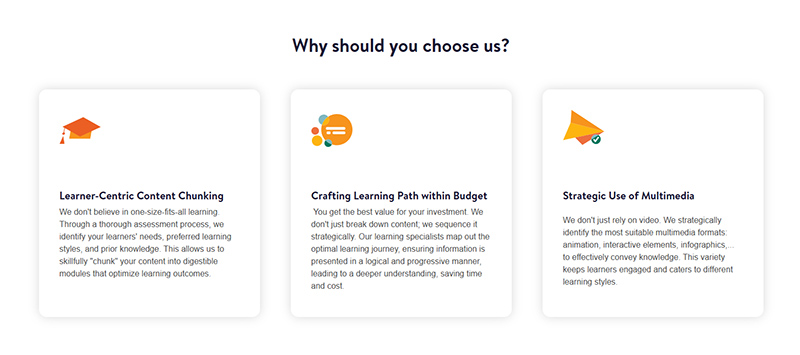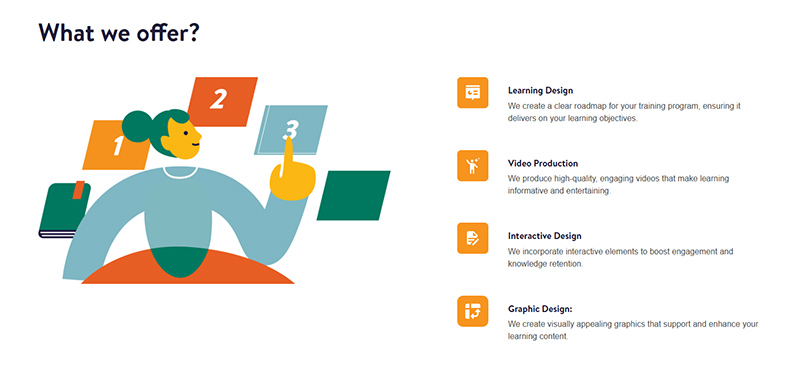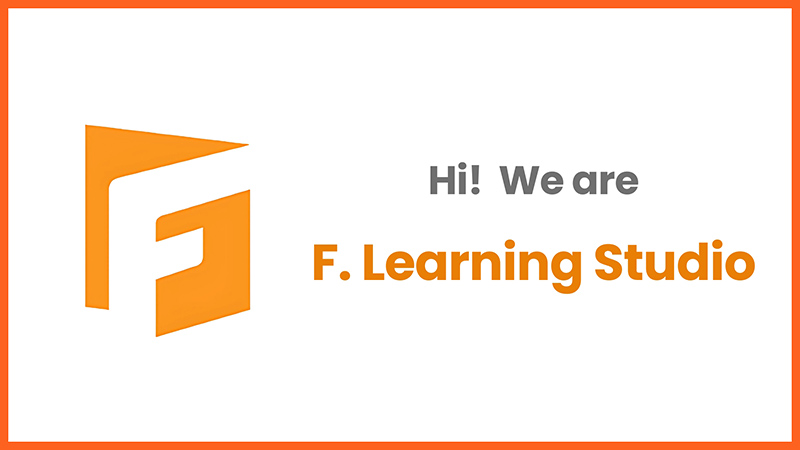You’ve invested in training videos – but your learners still seem confused, disengaged, or worse, forget everything by Monday. Here’s a hard truth: even the most beautifully animated training video can flop without a well-structured script.
Effective corporate training video scripts do much more – they guide behavior, simplify complex ideas, and spark learner engagement through pacing, tone, and visual logic. If you’re serious about creating videos that actually teach – not just talk – keep reading!
- Why Scriptwriting Can Make or Break Your Training Video
- 5 Elements Every Corporate Training Script Should Include
- DIY vs. Pro Scriptwriting: What’s Worth Doing Yourself?
- Real-World Examples of Effective Corporate Training Scripts
- How to Get Started: Tools and Expert Help
- Why Clients Partner with F.Learning Studio
- Final Thoughts
Why Scriptwriting Can Make or Break Your Training Video
You can have great visuals and voiceover – but if the script is unclear or overloaded, your message won’t stick.
Bad scripts lead to confusion, delays, and poor retention. In training, a good script aligns narration, visuals, and pacing. It guides learners, emphasizes key points, and supports action – not just information. Without a clear script, even the best video turns into a “data dump” that learners forget in hours. The script is the backbone of real learning.
💡 Takeaway: Scriptwriting isn’t just a production step – it’s a learning design choice. Nail the script, and your training works. Miss it, and you risk wasting time and budget.
Let get valuable insights: How to Write an Explainer Video Script in 7 Steps [With 8 Tips]
5 Elements Every Corporate Training Script Should Include
Even the best-intentioned training videos can fall flat if the script doesn’t connect with learners. A strong script isn’t just about sounding professional – it’s about making information stick. Below are 5 non-negotiable elements every training script needs to truly teach, not just inform:
1. A Clear Learning Objective Baked into the Opening
Most learners decide within the first 30 seconds whether a training video is relevant to them. Open your script by answering their silent question: “Why should I care?” This means the first lines of your script should:
- Introduce the purpose of the video
- Highlight the benefit to the learner
- Set expectations for what they’ll gain
✅ Example opening: “By the end of this video, you’ll know exactly how to handle customer complaints using our 3-step de-escalation model – even in high-stress situations.”
2. Conversational Tone and Learner-Focused Language
- Scripts aren’t textbooks. If you write like one, learners tune out.
- Use everyday language, contractions (“you’ll,” “let’s”), and active voice.
- Address the viewer directly – this creates engagement and mimics real conversation.
❌ Avoid: “The following procedure must be executed in accordance with protocol.”
✅ Use: “Here’s how to follow the process step by step – no guesswork needed.”
3. Visual Direction Cues (What’s on Screen vs. What’s Said)
A great script isn’t just narration – it includes cues for what the viewer should see. Whether you work with animators or produce in-house, the script should clearly note:
- What visuals appear (e.g. diagrams, scenes, motion graphics)
- When transitions happen
- When text or callouts appear on screen
💡 Tip: Use a two-column format (Voiceover | Visuals) to keep alignment crystal clear.
4. Engagement Hooks – Examples, Questions, or Scenarios
Passive learners don’t retain much. Good scripts stimulate thinking through interaction or storytelling.
Add:
- Realistic scenarios
- Rhetorical questions
- Analogies or “what would you do?” moments
📌 Example: “Imagine a customer starts yelling during a return. What’s your first move? Don’t worry — we’ll walk through it together.”
5. Reinforcement Techniques (Summary, Recap, Call to Action)
Learning isn’t one-and-done. Reinforce core ideas at the end by:
- Summarizing key takeaways
- Giving a clear next step (quiz, checklist, behavior to try)
- Repeating key terms for long-term memory retention
🔁 End your script with: “To recap: stay calm, ask clarifying questions, and use the 3-step model. You’ve got this. Now, let’s try a quick scenario.”
Bonus: Use a Script Template
Even if you’re not a professional writer, structure helps. Include these sections in your next script draft:
| Section | What It Covers |
| Hook / Opening | The “why” – makes learners care |
| Main Body | Core ideas, broken into scenes |
| Visual Directions | What appears, when |
| Recap & CTA | Summary + next step for the learner |
DIY vs. Pro Scriptwriting: What’s Worth Doing Yourself?
If you’ve ever thought, “We’ll just write the script ourselves – it’s internal training, not a Netflix series,” you’re not alone. But here’s the thing: training outcomes are directly tied to how well your message is written. And that’s not just about grammar – it’s about structure, flow, and instructional clarity. Let’s break it down:
When an In-House Draft Might Be Enough
There are cases where internal teams can handle the scripting:
- The topic is simple and procedural (e.g., how to log into a system)
- You already have clear SOPs and just need to “voice them out”
- The video is low-stakes or internal-only (e.g., department updates)
But even then, most internal drafts benefit from a professional polish – especially when time is tight or multiple stakeholders are involved.
Why Professional Script Writing Elevates Learning (and Saves You Headaches)
Here’s where expert scriptwriters bring massive value – especially studios like F. Learning Studio that combines: Animation + Learning Design Expertise.
1. Instructional logic
Pros know how to pace information to avoid overload. They structure content using proven techniques – like scaffolding, spaced repetition, and “micro-conversion” moments – to make complex concepts digestible.
2. Learner psychology
It’s not just what you say – it’s how learners emotionally receive it. Pros tailor tone, format, and flow to align with audience mindset and motivation.
Want content that speaks to how your learners think and feel?
Our eLearning Content Development service blends learner psychology, video storytelling, and multimedia design to build bite-sized, emotionally resonant training that sticks.
3. Visual synchronization
Good writers anticipate what learners see on screen. They write with motion design in mind – knowing when to pause for visuals, when to cue graphics, and how to turn dull narration into dynamic moments.
4. Time and stakeholder alignment
Instead of endless internal edits, a pro script streamlines feedback, aligns with your visual team, and reduces time wasted in production bottlenecks.
Comparison Table: DIY vs. Professional Scriptwriting
| Feature | DIY Script (Internal Team) | Pro Script (Studio + ID Expert) |
| Time Investment | High – multiple rounds of internal edits | Low – handled by experts with input checkpoints |
| Instructional Design | Often missing or improvised | Baked in using learning science |
| Visual Alignment | Siloed from animation team | Synchronized for flow and pacing |
| Tone & Engagement | Can be formal or inconsistent | Tailored, human-centered, and story-driven |
| Final Learner Impact | May confuse or underdeliver | Maximized retention and engagement |
Takeaway: Writing the Script Is the Training
Think of your script as the bridge between what you know and what your learners need to do. If that bridge isn’t structurally sound, nothing else matters – not the voiceover, not the animation, not even the LMS platform.
👉 If the goal is behavioral change, faster onboarding, or high-stakes compliance – DIY just doesn’t cut it.
Real-World Examples of Effective Corporate Training Scripts
You don’t need a Hollywood budget to create impact – just a script that’s smart, structured, and learner-first. Here are quick examples of how professionally written scripts drive results:
✅ Onboarding: Story-Driven Culture Alignment
Instead of listing company values, a narrative script walked new hires through a day in the life of a team member – making abstract values feel real and relatable.
Guardian Group – Script-Driven Onboarding with a Human Touch
To roll out a new HR strategy, Guardian Group needed to move beyond dense documents and engage employees meaningfully. F. Learning Studio transformed 20+ pages of content into 2 concise, culturally relevant training videos – starting with a learner-first script.
By combining relatable scenarios, clear structure, and visual cues, the script boosted engagement and helped employees quickly grasp the new direction.
You may interested be in:
- A Guide to a Successful Employee Onboarding Process for New Hires
- How to Utilize Video to Improve Customer Onboarding and Training 2026
✅ Compliance Training: Scenario-Based Microlearning
Rather than reading policy text aloud, the script used “what-would-you-do” moments to engage learners and spark reflection. This increased quiz scores by 28%.
Keep reading: 9 Impactful Compliance Training Video Examples to Inspire Yours
✅ Skills Training: Visual Explanations with Step-by-Step VO
A script for frontline sales reps broke down a complex sales framework into short modules, matching voiceover with animated visual cues to boost retention.
💡 In each case, the script didn’t just explain – it made learning stick.
For example, Integrity & Values enhanced their skills training by scripting clear, step-by-step voiceovers paired with visual explanations. The structured script made complex leadership concepts easier to follow and apply in real-world scenarios.
Read more:
- 12 Most Requested Soft Skills Training Topics for Corporate
- Communication Skills Training for Employees in 2026: Why Every Business Needs It
How to Get Started: Tools and Expert Help
Whether you’re refining an internal script or starting from scratch, the right support makes all the difference. Here’s how to move forward with clarity – and confidence.
Free Tools for Scripting and Planning
| Tool | Best For | Key Features | Link |
| Milanote | Visual planning and storyboarding | Drag-and-drop interface to map script flow and structure | milanote.com |
| Trello or Notion | Organizing and collaborating on script drafts | Organize by scenes, sections, or reviewers; great for working with SMEs/animators | trello.comnotion.com/ |
| Descript | Scripting with voiceover and timing in mind | Preview pacing, revise VO before recording; originally for video editing | descript.com |
Key Insight: Align Script and Animation from Day One
One of the biggest mistakes teams make is treating scripting and animation as separate steps.
At F. Learning Studio, we write scripts with animation in mind – making sure:
- Transitions land smoothly
- Voiceover syncs with visuals
- Learning moments are designed, not improvised
This saves hours in production and avoids costly rework.
The Hidden Risks of DIY Scriptwriting
Writing your own training scripts might seem cost-effective – until it starts costing you in clarity, production delays, and learner engagement. Internal drafts often lack instructional structure, drift off-message, or fail to sync with visuals, leading to a final product that looks polished but teaches poorly. When the stakes are high, “good enough” scripts just aren’t good enough.
👉 That’s why many companies choose to work with professional studios that bring together scriptwriting, animation, and learning design.
Why Clients Partner with F.Learning Studio
We’re not just scriptwriters – we’re instructional designers, animators, and learning strategists in one creative team. That means you don’t have to choose between:
- Style or substance
- Speed or scalability
- Engagement or clarity
Learning-Driven Scriptwriting
We don’t write scripts just to “sound good.” Every word is backed by learning psychology – structured to boost retention, guide attention, and align with specific learning objectives. Our writers collaborate closely with instructional designers and animators from day one.
If this is our first time working together, we would love to introduce an overview of our working process! Before starting the project, we hope you understand how we will work and how we appreciate your comments to improve our quality.
Visual Thinking from the Start
Unlike traditional agencies or freelance writers, we’re an animation-first studio. That means we write scripts with visuals in mind – planning motion, transitions, and emphasis cues directly into the script so your video flows with clarity and impact.
With over 9 years of experience, we have received numerous positive feedback from clients
Fast, Responsive Support (24/4 Availability)
We know time zones can slow things down – so we’ve built a 24/4 customer support system to stay responsive across markets. Whether you’re reviewing a draft, need input mid-project, or have a last-minute tweak, we’re here, reliably and quickly.
Ask your questions NOW
and get answered
within 12 hours!
Smart Pricing for Real ROI
You don’t need a six-figure budget to create training that works. Our pricing is transparent and tailored to your needs – designed to help you maximize learning outcomes without blowing your budget. Whether you need script-only support or full video production, we scale with you.
Get the best values
for your project
See how much your project might cost at F.Learning Studio!
Final Thoughts
Corporate training video scripts are the foundation of any impactful learning experience – and they’re too important to leave to guesswork. Even with the best intentions, DIY scriptwriting often leads to missed opportunities. It might get the job done – but it rarely gets the results.
Let’s create a script that doesn’t just inform – it teaches, guides, and drives behavior change. Whether you’re onboarding new hires or rolling out a company-wide initiative, our team can help you structure every word for maximum learning impact.
📥 No pressure – just start by exploring your options. Book a free consultation with our team or grab one of the trusted script templates linked above to get your draft going.
Or contact us via:
- Email: [email protected]
- Fanpage: https://www.facebook.com/f.learningstudio
- Website: https://flearningstudio.com/
- LinkedIn: https://www.linkedin.com/company/f-learning-studio/
Don’t stop here – keep reading to get more valuable insights:
- 3 Virtual Employee Engagement Ideas that Work in 2026
- Corporate Training 101: Your Complete Guide to Success in 2026
- Top 7 Explainer Video Script Writing Services for Your Project

Sean Bui, the founder and creative director of F.Learning Studio, is a respected leader in the e-learning and multimedia production industry. With over 10 years of experience, he has dedicated his career to helping organizations create engaging and impactful learning experiences.
Under his leadership, F.Learning Studio has grown into a trusted partner for organizations in the education, healthcare, and corporate training sectors, producing over 2,000 minutes of educational animation.











